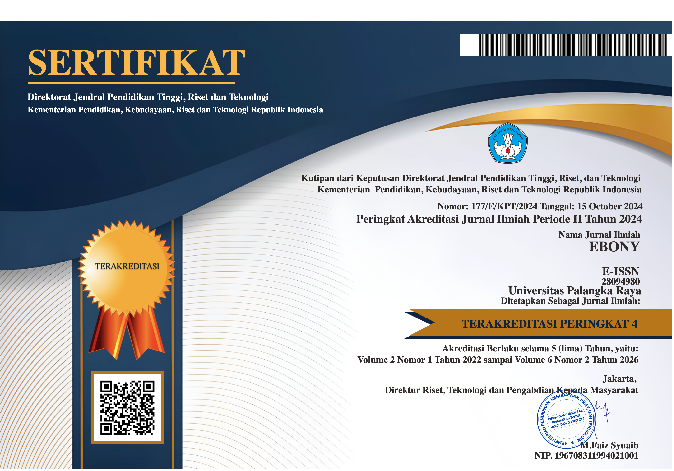Student-teachers’ Emotion Regulation in Speaking
DOI:
https://doi.org/10.37304/ebony.v4i1.12299Keywords:
student-teachers, emotion, regulation of emotion, speakingAbstract
Several scholars in education have asserted that emotions play a significant role in motivation to learn. On the side of self-regulated learning theory, it is believed that a learner would succeed more if he owned fully constructed self-regulation in learning. This research aims to describe the student-teachers’ academic emotions, specifically in speaking, and later to elaborate on their tendency to regulate it. The researcher applied mixed methods in this study. The data was obtained through questionnaires and in-depth interviews. Supporting theory used to gain the description of the student-teacher state of academic emotion is the theory proposed by Pekrun et al. (2002). The result showed that the student-teachers tend to perceive negative emotions about their ability to speak. However, they managed to use a cognitive reappraisal strategy to modify their academic emotion in both stages of preparation and mastering speaking. Meanwhile, they tend to use expressive suppression to manage their academic emotion in performing speaking. Moreover, the implications and implementation of emotion regulation in the East Nusa Tenggara context as a part of the researcher’s reflection are also discussed.
Downloads
References
Aguilar, A. P., & Lopez, M. G. (2013). Emotions as learning enhancers of foreign language learning motivation. PROFILE Issues in Teachers' Professional Development, 15(1), 109–124.
Ary, D. (2010). Introduction to Research in Education. Nelson Education Ltd
Balzarotti, S., John, O. P., & Gross, J. J. (2010). An Italian adaptation of the Emotion Regulation Questionnaire. European Journal of Psychological Assessment, 26(1), 61–67. https://doi.org/10.1027/1015-5759/a000009
Bandura, A. (1997). Self-efficacy: The exercise of control. W H Freeman/Times Books/ Henry Holt & Co.
Bown, J., & White, C. J. (2010). Affect in a self-regulatory framework for language learning. System, 38(3), 432–443.
Brophy, J. (1998). Failure syndrome students. ERIC Digest. Retrieved June 27, 2007 from http://ceep.crc.uiuc.edu/eecearchive/digests/1998/brophy98.pdf
Brown, A. (1987). Metacognition, executive control, self-regulation, and other more mysterious mechanisms. In F. Weinert & R. Kluwe, eds., Metacognition, Motivation, and Understanding (pp. 65‐116). Hillsdale, NJ: Erlbaum.
Covington, M. V. (1998). The will to learn: A guide for motivating young people. Cambridge University Press.
Creswell, J. W. (2011). Research Design: Qualitative, Quantitative and Mixed Method Approaches. (4th Ed.). Sage Publications.
Deci, E. L., & Ryan, R. M. (1985). Intrinsic motivation and self-determination in human behavior. Plenum.
Gross, J.J. (2001). Emotion regulation in adulthood: Timing is everything. Current Directions in Psychological Science, 10, 214-219.
Gross, J.J. (2002). Emotion regulation: Affective, cognitive and social consequences. Psychophysiology, 39, 281-291.
Gross, J. J., & John O P (2003) Individual differences in two emotion regulation processes: Implications for affect, relationships, and well-being. Journal of Personality and Social Psychology, 85, 348-362.
Gross, J.J., & Thompson, R.A. (2007). Emotion regulation: Conceptual foundations. In J.J. Gross (Ed.), Handbook of emotion regulation (pp. 3-24). Guilford Press.
Hashwani, M. S. (2008). Students’ Attitudes, Motivation and Anxiety towards English Language Learning. Journal of Research and Reflections in Education, 2(2).
Imai, Y. (2010). Emotions in SLA: New insights from collaborative learning for an EFL classroom. Modern Language Journal, 94(2), 278–292.
Jacobs, J., & Paris, S. (1987). Children’s metacognition about reading. Issues in definition, measurement, and instruction. Educational Psychologist, 22, 255-278. doi:10.1207/s15326985ep2203&4_4
Jones, P. (1996). Planning an oral language program. In Pauline Jones (ed.) Talking to learn. PETA.
Kelly, W. (2004). Academic Emotions. Teaching at Trend, 6(3), 2-3.
Lazarus, R. S., and Alfert, E. (1964). Short-circuiting of threat by experimentally altering cognitive appraisal. J. Abnorm. Psychol. 69, 195–205. doi: 10.1037/h0044635
Livingston, J. (1997). Metacognition: An Overview. State University of New York at Buffalo.
Mauss, I.B., Cook, C.L., Cheng, J.Y.J., & Gross, J.J. (2007). Individual differences in cognitive reappraisal: Experiential and physiological responses to an anger provocation. International Journal of Psychophysiology, 66, 116-124.
Mbato, C. L. (2013). Facilitating EFL learners' self-regulation in reading: implementing metacognitive approach in an Indonesian higher education context. Ph.D Dissertation, Southern Cross University.
Pekrun, R., Goetz, T., Titz, W., & Perry, R. P. (2002). Academic emotions in students' self-regulated learning and achievement: A program of qualitative and quantitative research. Educational Psychologist, 37(2), 91–105. https://doi.org/10.1207/S15326985EP3702_4
Pekrun, R., & Linnenbrink-Garcia, R. (Eds.). (2017). Handbook of emotions and education.
Richards, J. C. (2008). Second Language Teacher Education Today. RELC Journal, 39, 158-177. http://dx.doi.org/10.1177/0033688208092182
Scherer, K. R. (2005). Unconscious Processes in Emotion: The Bulk of the Iceberg. In L. F. Barrett, P. M. Niedenthal, & P. Winkielman (Eds.), Emotion and consciousness, pp. 312–334. The Guilford Press.
Schraw, G. & Moshman, D. (1995). Metacognitive theories. Educational Psychological Review 7: 351‐371.
Schutz, P. A., & DeCuir, J. T. (2002). Inquiry on emotions in education. Educational Psychologist, 37.
Sheldon, K. M., Ryan, R. M., Rawsthorne, L. J., and Ilardi, B. (1997). Trait self and true self: cross-role variation in the big-five personality traits and its relations with psychological authenticity and subjective well-being. J. Pers. Soc. Psychol. 73, 1380–1393. doi: 10.1037//0022-3514.73.6.1380
Sheppes, G., & Gross, J. J. (2011). Is timing everything? Temporal considerations in emotion regulation. Personality and Social Psychology Review, 15(4), 319–331. https://doi.org/10.1177/1088868310395778
Temple, C. And Gillet, J. W. (1984). Language Arts: Learning Processes and Teaching Practices. Little Brown and Company Ltd.
Yukselir, C. (2014). An Analysis of the Perceptions on Academic Emotions and Emotional Experiences in English Language Teaching. International Journal of English Language Education. 2. 10.5296/ijele.v2i2.6617.
Weiner, B. (1992). Human motivation: Metaphors, theories, and research. Sage Publications, Inc.
Downloads
Published
How to Cite
Issue
Section
License
Copyright (c) 2024 Aloysia Berlindis Lasar

This work is licensed under a Creative Commons Attribution 4.0 International License.











